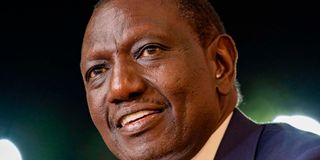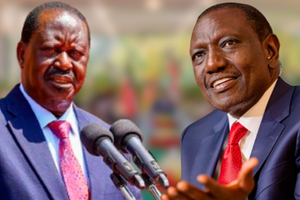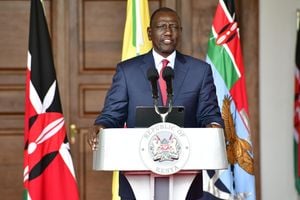
President William Ruto during the Presidential Roundtable at State House, Nairobi.
President William Ruto is facing a tough balancing act in coming up with a new Cabinet amid pressure from the youth, church and civil society pushing for fresh faces.
As the President seeks to finalise the new Cabinet this week, he is walking a tightrope in trying to navigate between sweeping reforms pushed by the youth and appeasing his support base with eyes on his re-election bid in 2027.
Already, the civil society and a section of church leaders have publicly dismissed the list of partial Cabinet nominees announced by the President last week, saying the Head of State is not committed to implementing reforms agitated for by Gen Z.
Six out of the first-half of the appointees announced by Dr Ruto last week are old faces from the dismissed Cabinet. They are Kithure Kindiki (Interior), Aden Duale (Defence), Alice Wahome (Lands), Davis Chirchir (Roads and Transport), Soipan Tuya (Environment) and Rebecca Miano (Attorney-General).
Anglican Church of Kenya Maseno South Diocese Bishop Charles Ong’injo accused the Head of State of insincerity, saying the move to return the six names to the Cabinet is adding salt to an injury.
“What the President has done has made people angrier. It seems he does not want people to leave protests. Even though he is asking who is funding the protests, I think he is the greatest funder by the actions he is taking,” said Mr Ong’injo.
Nakuru Catholic Diocese Bishop Cleophas Oseso expressed disappointment in the list, saying the appointments fell short of the country’s expectations.
He termed the changes that saw the recycling of CSs previously rejected by the public as cosmetic and likely to embolden the youth, warning that the move could incite a new wave of demonstrations.
“The new list of Cabinet appointees does not meet public expectations, and we hope that Parliament will fulfil its role during the vetting process,” Mr Oseso said.
On the other hand, civil society groups have accused the President of failing to listen to Kenyans by nominating the six ministers he had fired as a result of their incompetence.
Coast Civil Societies Network on Human Rights Chairperson Zedekiah Adika termed the appointments as an injustice to Kenyans, adding the President has wasted an opportunity to begin on a new slate.
“Kindiki and Duale dockets have been the most complained about and needed to be investigated, more so Kindiki on the deaths, abductions and maiming of protesters,” said Mr Adika.
“It looks like the president may have been buying time to allow the pressure of the moment to ease. With regard to the others who've been appointed,” said Ms Wanjiku Gikonyo, Kenya Human Rights Commission board member.
Despite the five new faces being technocrats, a number of them are linked to the old faces they are set to replace should they be cleared by Parliament.
Dr Andrew Mwihia Karanja (Agriculture and Livestock Development), and Julius Ogamba (Education) have links to the men they are set to replace with reports claiming that Mr Karanja had at one time served as Mithika Linturi’s personal assistant while Mr Ogamba was Mr Ezekiel Machogu’s Kisii gubernatorial race running mate in the last elections.
Kenyans have now warned the National Assembly, which is set to consider the nominees during vetting, against approving nominees rejected by Kenyans.
Political commentator Mark Bichachi says the President finds himself at crossroads where there is new direction demanded of him whilst he also has his own vision and direction.
He opines that despite Gen Z giving him a fresh start, the Head of State has to balance old and new political realities seeing that 2027 is looming large.
“He (President) has to remember that he has to maintain his votes in the Mountain and gamble on the fact that Kenya usually reverts to tribal votes. We must also consider that his 11 appointments were meant to anticipate other appointments to balance out his Cabinet,” said Mr Bichachi.
“The question that still lingers is can old formulae answer current Gen Z questions or does he simply have to wait until Gen Z grows tired of politics and Kenya reverts to normal?” he posed.
Nyeri Governor Mutahi Kahiga asked Parliament to redeem itself by listening to the people to avoid landing the country to the same problems witnessed after they passed the controversial Finance Bill, 2024.
“If Kenyans say they don’t want an individual, we have more than 50 million people to pick from. I don’t know why we should continue being held captive by certain names. If the people don’t want an individual, then let the MPs vote with their conscience and not along party positions. Voting along party positions almost took the country to the dogs,” said Mr Kahiga.
The second-term governor said it is important for the President to find a balance between the demands by the Gen Zs and 2027 matrix, and how he handles the remaining 10 slots will reflect his commitment to what people are saying.
He argued that Dr Ruto will be forced to look further than the Cabinet to find a balance in terms of setting up a broad-based government.
“He would be a foolish politician to ignore that there will be an election in 2027 and some of the things he will do now might have a bearing on that,” he said.
“He must also seize the moment to give the country a new direction. Listening to the mood of the country, I don’t think they were looking for a re-appointment. I don’t envy the President right now. I know he is in a tight spot,” he added.
Despite declaring his intention to set up a broad-based government when he dissolved his inaugural Cabinet, the President appears to be caught up between a rock and a hard place amid competing political interests.
Already, six out of the 11 nominees are from the vote-rich Mt Kenya, underscoring the significance of the region to his bid for a second term. The development has left the other seven regions with little to smile about in terms of expectations of an all-inclusive government.
Collectively, Mt Kenya region – which gave Dr Ruto nearly three million votes out of 5.7 million registered voters – had seven ministers and the AG positions for the 10 counties.
The President polled 7.1 million votes to secure the 50 percent plus one required to win the presidency in the first round, edging out his main rival, Mr Odinga who got 6.9 million votes.
With the President yet to extend the purge in his administration to include Principal Secretaries (PSs) or other senior government officials in State agencies and parastatals, and with little intention of pushing for appointment of chief administrative secretaries, the Cabinet slots appear to be the only available national cake to be used to reflect the face of Kenya.
Moreover, other regions have also began agitating to have their “people” nominated by the President even as Azimio, particularly ODM, which was keen to join the government, is divided on whether they should forward their nominees to be part of the broad-based government.
Reports are rife that the President was set to name 14 nominees only for a last-minute about-turn from Mr Raila Odinga on three picks allied to his party forced Dr Ruto to only fill 11 slots.
The changes instituted by President Ruto follow sustained pressure from the Gen Z youth who are demanding an overhaul of the Kenya Kwanza government.
The Gen Z have also rejected any calls for dialogue, formation of a broad-based government involving power-sharing among the political class and have warned against any of the sacked CSs making a comeback to the government.
However, the President has found pinned against the wall on how to play his cards amid mounting pressure from the political class vouching for their interests.
Governor Kahiga was public with his warning to the President to tread carefully as he prepares to name a new Cabinet.
The governor argued that since the region accounted for 47 percent of the total votes that secured the Kenya Kwanza government's victory, President Ruto should ensure the new Cabinet reflects the same.
He said the region had eight seats in the dissolved Cabinet and that the region would not take anything less since the seats were part of a pre-election agreement.
The sentiments from the governor stem from earlier statements by Deputy President Rigathi Gachagua that the current administration is a government of shares with Mt Kenya region contributing the biggest share.
“You cannot talk of a broad-based government when more than a half of your nominees are from one region. We don’t know what the term meant. Did it mean gender, professionalism or regions,” said Saboti MP Caleb Amisi.
He said the President could have been sending a message to the Mt Kenya region that he is not isolating the region by trying to work with the former premier.
“But I think it is too late. For the people, it is about the overall business environment and not positions. The region wants a dependable tax regime conducive for their businesses. Even if the President appointed the entire Cabinet from the region, they will still be on the streets,” he added.
Political commentator Prof Macharia Munene avers the President is a hostage with very little room to manoeuver.
He notes that by bringing back the six old faces, having fired them for incompetence, Dr Ruto has to explain to Kenyans how all of a sudden they are no longer incompetent.
The USIU don also observes that the Head of State could be under significant pressure from different quarters, especially from the former Cabinet.
“His (Ruto) statements don’t seem to match his actions. He is trying to assert himself to say he is in charge and it does not matter what people want but what he wants,” opines Prof Munene.










